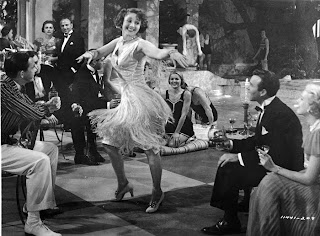
This photo is taken from a scene in the first version of The Great Gatsby when it was adapted to film.
Quote
"'This is an unusual party for me. I haven't even seen the host. I live over there--' I waved my hand at the invisible hedge in the distnace, 'and this man Gatsby sent over his chauffeur with an invitation.'
For a moment he looked at me as if he failed to understand.
‘I’m Gatsby,’ he said suddenly.
‘What!’ I exclaimed. “Oh, I beg your pardon’” (pg 47-48).
This excerpt is taken from the main character’s, Nick Carraway’s, first time attending a party at Jay Gatsby’s house. He tried to search for the host earlier in the evening but wasn’t able to find him and didn’t even know what he looked like. He eventually finds himself conversing with someone who was in the war with him and discovers, through an embarrassing mistake, that it is actually Gatsby that he is talking to.
I chose this section from The Great Gatsby to represent the book as a whole because neither the reader, nor Nick Carraway, even learns the whole truth about Gatsby until about 2/3 of the way into the book. Though Carraway can now put the name with the face, there is still so much mystery surrounding who Gatsby really is. There are rumors about where he came from, and Gatsby doesn’t even tell the truth for some time. Both Carraway and you, the reader, don’t fully understand Gatsby for the majority of the book, and a large portion of the whole point of the novel is trying to figure out the truth of Gatsby.
Connections
One way in which this novel connects back to my life is the author’s use of rumors. In The Great Gatsby, all of those who attend Gatsby’s parties don’t really know him. They speculate that he once killed a man, or that he was a German spy during the war, or that he attended
Rumors are unyielding in their ways, specifically in the sense that, while certain rumors may die down, there will always be an untruth spreading somewhere about someone. An important aspect to comment on is how these rumors, both in the novel and in real life, can distort one’s view of the person in question.
The Great Gatsby is also a great representation of the 1920’s in
Finally, The Great Gatsby is also a good representation people (or their works) who didn’t receive fame until after their death. F. Scott Fitzgerald received much notoriety as an author during his time, but The Great Gatsby was sub-par at best when it was released. It wasn’t until after his death and people began reading Gatsby again that it gained popularity. It is now known to be a classic. The popularity of a works after the death of its creator is something of a common occurrence. It happened with Edgar Allan Poe and Galileo Galilei. In Poe’s case, his many prose and short stories were sometimes published, but rarely for money. Not many people even knew of him. Much after his death, his work became famous as a new style of writing, and his poem, The Raven, is an extremely popular literary work. As for Galilei, he was a scientist, a mathematician, and an astronomer. He proved the theory that the earth orbits the sun, as opposed to the other way around. During his time, he received much criticism for this because it was seen as anti-religious, but now-a-days, all of his work is commonly accepted and is central to much of the scientific community.
Questions
- Why did Gatsby choose to lie about his past (it didn’t seem horrible when it was finally revealed)?
- Was Myrtle Wilson running out into the street because she thought Tom was driving the yellow car?
- Similarities between Daisy and Tom (e.g. Nick says how they are both immature in the sense that they make messes and then hide behind their money with each other, allowing others to clean up)?
- How does Nick change from the beginning of the novel to the end?
- What is the significance of Doctor T.J. Eckleburg’s eyes?
Reflection
In my opinion, The Great Gatsby was a fine book. Nothing special, but not horrible like a lot of people say. Some parts of the book—mainly the dialogue—seemed kind of disjointed, though that could just be because language was different in the '20s than it is now.
I found that this novel was really hard to start. The first chapter was intensely boring because I didn’t know who Gatsby was yet, and there was really nothing of interest happening. Once I was about forty pages into the book, I was actually interested in what was happening and wanted to continue reading. Problem is, the book is only 180 pages, so almost 1/3 of the book is unexciting, and the rest is only mildly interesting.
No comments:
Post a Comment